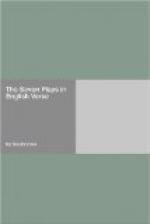ANT. How so?
CH. No harm shall touch you.
ANT. I know that.
CH. What
then
Further engrosseth thee?
ANT. How to get home
I know not.
CH. Seek not for it.
ANT. Weariness
O’erweighs me.
CH. Hath it not before oppressed thee?
ANT. Before, it vexed me; now it overwhelms.
CH. A mighty sea of misery is your lot.
ANT. Woe is me! O Zeus! And whither
must we go?
Unto what doom doth my Fate drive me now?
CH. Children, lament no longer. ’Tis
not well
To mourn ’mongst those with whom the honoured
dead
Hath left the heirloom of his benison.
Enter THESEUS.
ANT. Theseus, behold us falling at thy feet.
THE. What boon, my children, are ye bent to obtain?
ANT. Our eyes would see our father’s burial-place.
THE. ’Tis not permitted to go near that spot.
ANT. O Athens’ sovereign lord, what hast thou said?
THE. Dear children, ’twas your father’s
spoken will
That no man should approach his resting-place,
Nor human voice should ever violate
The mystery of the tomb wherein he lies.
He promised, if I truly kept this word,
My land would evermore be free from harm.
The power which no man may transgress and live,
The oath of Zeus, bore witness to our troth.
ANT. His wishes are enough. Then, pray thee,
send
An escort to convey us to our home,
Primeval Thebes, if so we may prevent
The death that menaces our brethren there.
THE. That will I; and in all that I may do
To prosper you and solace him beneath,—
Who even now passes to eternity,—
I must not falter. Come, lament no more.
His destiny hath found a perfect end.
* * * * *
NOTES
SOME PROPER NAMES
AIDONEUS, Hades or Pluto.
ARES, The War-God, a destructive Power.
DEO, Demeter.
ERINYES, the Furies.
HELIOS, The Sun-God.
RHEA, the Mother of the Gods.
THEBE, the town of Thebes personified.
ANTIGONE.
1 P. 6, l. 126. The serpent. The dragon, the emblem of Thebes.
2 l. 130. Idly caparisoned. Reading [Greek: huperopliais].
3 P. 7, l. 140. Self-harnessed helper. An allusion
to the [Greek:
seiraphoros], or side trace-horse, in
a chariot-race.
4 P. 13, l. 342. Children of the steed. Mules
are so-called by
Homer.
5 P. 30, l. 955. Dryas’ hasty son. Lycurgus. See Homer, Iliad, vi.
6 l. 971. Phineus’ two sons. Idothea,
the second wife of Phineus,
persecuted his two sons by Cleopatra,
a daughter of Boreas, whom he
had repudiated and immured. The Argonauts
saw them in the condition
here described.




